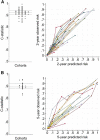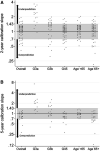M.E. Grams reports Advisory or Leadership Role: American Journal of Kidney Diseases, Clinical Journal of the American Society of Nephrology, Journal of the American Society of Nephrology Editorial Board, NKF Scientific Advisory Board, KDIGO Executive Committee, USRDS Scientific Advisory Board and Other Interests or Relationships: Grant funding from NKF, which receives funding from multiple pharmaceutical companies, grant funding from NIH, payment from academic institutions for grand rounds, and payment from NephSAP. J. Coresh reports Consultancy: Healthy.io; Ownership Interest: Healthy.io; Research Funding: National Institutes of Health (NIH), National Kidney Foundation (NKF, which receives industry support); and Advisory or Leadership Role: Healthy.io, and National Kidney Foundation. K. Matsushita reports Consultancy: Akebia and Kyowa Hakko Kirin; Honoraria: Fukuda Denshi, Kowa Company Ltd.; and Advisory or Leadership Role: Kidney International, American Journal of Kidney Disease, Circulation Reports. S. Bell reports Consultancy: AstraZeneca; and Honoraria: AstraZeneca. J.J. Carrero reports Consultancy: AstraZeneca, Bayer, Nestle; Research Funding: Amgen, Astellas, AstraZeneca, Swedish Heart and Lung Foundation, Swedish Research Council, and ViforPharma; Advisory or Leadership Role: Advisory Committee: AstraZeneca, Fresenius, Nestle, Editorial board: Journal of Nephrology, Nephrology, Dialysis and Transplantation, American Journal of Kidney Disease, European Heart Journal; Speakers Bureau: Abbott Laboratories, AstraZeneca, Baxter, Fresenius, and Viforpharma; and Other Interests or Relationships: European Renal Nutrition working group at the ERA-EDTA, and Ïnternational Society of Renal Nutrition and Metabolism. G. Chodick reports Institutional research funding from Merck & Co., Inc. M. Evans reports Consultancy: AstraZeneca, Vifor Pharma; Research Funding: Astellas pharma, institutional grant; Honoraria: Payment for lectures by Astellas, AstraZeneca, Baxter healthcare, Fresenius Medical Care, and Vifor Pharma; Advisory or Leadership Role: Astellas, AstraZeneca and Vifor Pharma Advisory board; and Other Interests or Relationships: Member of Steering committee in the Swedish Renal Registry and the ERA-EDTA Registry Committee. H.J.L. Heerspink reports Consultancy: AstraZeneca, Bayer, Boehringer Ingelheim, CSL Behring, Chinook, Dimerix, Eli-Lilly, Gilead, GoldFinch, Janssen, Merck, NovoNordisk, and Travere Pharmaceuticals; Research Funding: AstraZeneca, NovoNordisk and Janssen research support (grant funding directed to employer); Honoraria: Lecture fees from AstraZeneca; and Speakers Bureau: AstraZeneca. L.A. Inker reports Consultancy: Diamtrix; Research Funding: L.A. Inker—funding to institute for research and contracts with the Chinnocks, National Institutes of Health, National Kidney Foundation, Omeros, and Reata Pharmaceuticals; and consulting agreements with Tricida Inc.; Advisory or Leadership Role: Alport Foundation—Medical Advisory Council, NKF—Scientific Advisory Board; and Other Interests or Relationships: American Society of Nephrology member, National Kidney Foundation member. K. Iseki reports Consultancy: Kyowa Hakko Kirin, MedyGate, Inc; and Honoraria: Bayer, Chugai, Daiichi Sankyo, Genzyme Japan, Kyowa Hakko Kirin, Otsuka, and Teijin. P.A. Kalra reports Consultancy: Astellas, Novartis, Otsuka, Unicyte, and Vifor; Research Funding: Astellas, BergenBio, Evotec, GSK, and Vifor; Honoraria: AstraZeneca, Bayer, Fresenius, GSK, MundiPharma, Napp, Novartis, Otsuka, Pharmacosmos, UCB, Unicyte, and Vifor; Advisory or Leadership Role: AstraZeneca, GSK, Pharmacosmos, and Vifor; and Speakers Bureau: AstraZeneca, Bayer, Napp, Pharmacosmos, and Vifor. H.L. Kirchner reports Employer: Geisinger; and Consultancy: Baylor College of Medicine. B.J. Lee reports Employer: Hawaii Permanente Medical Group A. Levin reports Consultancy: AstraZeneca, Bayer, Boeingher Ingleheim, Chinook Therapeutics, GSK, Janssen, Kidney Foundation of Canada, NIH, and REATA; Research Funding: AstraZeneca, Boehringer Ingelheim, Canadian Institute of Health Research (CIHR), CITF (Canadian Immunology Task Force), GSK, Health Research BC, Kidney Foundation of Canada, MOH BC, and Shared Care BC; Honoraria: AstraZeneca, Bayer, GSK, Janssen, and NIH; Advisory or Leadership Role: AstraZeneca, Boehringer Ingelheim, and NIDDK, DSMB for NIDDK, Kidney Precision Medicine, U Washington Kidney Research Institute Scientific Advisory Committee; International Society of Nephrology Research Committee, KRESCENT (Kidney Scientist Education Research National Training Program), GSK, Chinook Therapeutics, REATA BC Renal (Exec Director), Steering Committee Chair CURE Consortium, CADTH, CITF; and Other Interests or Relationships: CREDENCE National Coordinator from Janssen, directed to academic team, NIDDK CURE Chair Steering Committee, International Society of Nephrology, Canadian Society of Nephrology, Kidney Foundation of Canada, Steering Committee ALIGN trial, DSMB Chair RESOLVE Trial (Australian Clinical Trial Network). R.W. Major reports Research Funding: AstraZeneca UK; and Speakers Bureau: AstraZeneca UK. G.N. Nadkarni reports Consultancy: Daiichi Sankyo, GLG consulting, Qiming Capital, Reata, Renalytix, Siemens Healthineers, and Variant Bio; Ownership Interest: Data2Wisdom LLC, Doximity, Nexus iConnect, Pensieve Health, Renalytix, and Verici; Research Funding: Renalytix; Honoraria: Daiichi Sankyo; Patents or Royalties: Renalytix; Advisory or Leadership Role: Renalytix; and Speakers Bureau: Daiichi Sankyo. M.M. Sood reports Consultancy: Astrazeneca; Honoraria: Astrazeneca; and Advisory or Leadership Role: GlaxoSmithkline, Otsuka, and Servier. N. Staplin reports Research Funding: Boehringer Ingelheim, and Novo Nordisk N. Stempniewicz reports Employer: GSK; and Research Funding: GSK. B. Stengel reports Research Funding: AstraZeneca, Fresenius Medical Care, GSK, Vifor Fresenius. K. Sumida reports Honoraria: Siemens Healthineers. M. Woodward reports Consultancy: Amgen, Freeline; and Ownership Interest: MIS Statistical Consultants LLC. A.Y.-M. Wang reports Advisory or Leadership Role: Editorial Board: Journal of the American Society of Nephrology, Kidney International, Clinical Journal of the American Society of Nephrology, Nephrology Dialysis Transplantation, Nephron Clinical Practice (Associate Editor), American Journal of Nephrology, Journal of Nephrology, Journal of Diabetes, Journal of Renal Nutrition, Journal of Geriatric Cardiology, Blood Purification, Biomedicine Hub, EMJ; President of International Society of Renal Nutrition and Metabolism; Council member of ISPD; Executive committee member of SONG Initiatives; Committee member of ISN-ACT, Deputy Chair of ISN North and East Asia Regional Board, Deputy Chair of ISN Education working group; and Other Interests or Relationships: President of International Society of Renal Nutrition and Metabolism, Councilor of ISN, Council member of ISPD, Deputy Chair of ISN Regional Board, Deputy Chair of ISN Education working group, Committee member of ISN-ACT, Member of SONG-HD CVD Outcome Measures Working Group, Member of SONG-PD Working Group, Executive committee member of SONG Initiatives. N. Tangri reports Consultancy: Tricida Inc., PulseData Inc, Mesentech Inc., Renibus, Marizyme; Ownership Interest: Tricida Inc., PulseData Inc, Mesentech Inc., Clinpredict Ltd, Renibus, Marizyme, Klinrisk, Quanta; Research Funding: Astra Zeneca Inc., Tricida Inc, Janssen, Otsuka, BI-Lilly, Bayer; Honoraria: Otsuka Pharmaceuticals, Astra Zeneca Inc., BI-Lilly, Janssen, Pfizer, Bayer; Patents or Royalties: Marizyme, Klinrisk; Advisory or Leadership Role: Tricida Inc., Clinpredict, Klinrisk; and Other Interests or Relationships: National Kidney Foundation; Founder—Klinrisk, Clinpredict.




